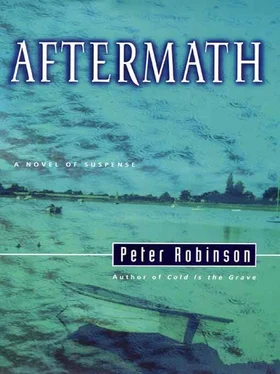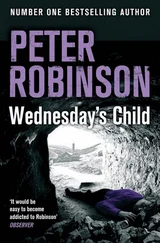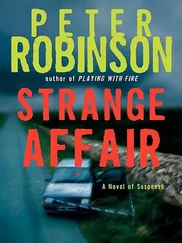“Hardly. There’s a lot more we need to know, and there are certain formalities, procedures to be followed. Anyway, it’s all changed now that Terry’s died, hasn’t it?”
Lucy looked away. “I don’t know what you mean.”
“You can speak freely now. You don’t have to be afraid of him.”
“Oh, I see.”
“What did you think I meant, Lucy?”
“Nothing.”
“That you could change your story? Just deny everything?”
“I told you. Nothing.”
“But there’s the blood to explain now. And the yellow fibers. We know you were in the cellar. We can prove it.”
“I don’t know anything about that. I don’t remember.”
“Very convenient. Aren’t you sorry Terry’s dead, Lucy?”
Lucy packed her nail polish away in her handbag. “Of course I am. But he beat me up. It was him who put me here, him who got me into all this trouble with the police. It’s not my fault. None of it’s my fault. I haven’t done anything wrong. Why should I have to be the one who suffers?”
Banks shook his head and stood up. “Maybe we’d better just go.”
Lucy looked over to Julia Ford.
“I’ll come with you,” said Julia. “I’ll be present when you’re questioned and nearby in case you need me.”
Lucy managed a weak smile. “But you won’t stay in the cell with me?”
Julia smiled back, then looked at Banks. “I’m afraid they don’t make doubles, Lucy.”
“That’s right,” said Banks. “Like girls, do you, Lucy?”
“There was no need for that, Superintendent,” Julia Ford said. “And I’ll thank you to keep any more questions you might have until we’re in the interview room.”
Lucy just glared at Banks.
“Anyway,” Julia Ford went on, turning back to Lucy. “Let’s not be pessimistic. It might not come to that.” She turned to Banks. “Might I suggest, Superintendent, that we leave by a discreet exit? You can’t have failed to notice the media presence.”
“It’s a big story for them,” Banks said. “But yes, that’s a good idea. I’ve got another one, too.”
“Oh?”
“That we take Lucy to Eastvale for questioning. You and I know damn well that Millgarth will be a zoo once the press find out she’s there. This way we’ve got a chance of avoiding all that chaos, at least for a while.”
Julia Ford thought for moment, then looked at Lucy. “It’s a good idea,” she said.
“Will you come to Eastvale with me? I’m scared.”
“Of course.” Julia looked at Banks. “I’m sure the Superintendent here can recommend a decent hotel?”
“But how could she possibly know I’m seeing you?” Maggie asked Dr. Susan Simms at the start of her session that afternoon.
“I’ve no idea, but you can be certain I didn’t tell anyone. And I told her nothing.”
“I know,” said Maggie. “Thank you.”
“Think nothing of it, dear. It’s a matter of professional ethics. This implied support of yours for Lucy Payne, is it true?”
Maggie felt her anger bristle again as she remembered her argument with Banks that morning. She still felt upset by it. “I think Lucy’s been a victim of abuse, yes.”
Dr. Simms remained silent for a while, gazing our of the window, then she shifted in her chair and said, “Just be careful, Margaret. Just be careful. You seem to be under a lot of stress. Now, shall we begin? I believe last time we were talking about your family.”
Maggie remembered. It was their fourth session, and the first time they’d touched on Maggie’s own family background. Which surprised her. She’d been expecting Freudian questions about her relationship with her father right from the start, even though Dr. Simms had insisted she wasn’t a Freudian analyst.
They were sitting in a small office overlooking Park Square, a peaceful, elegant bit of eighteenth-century Leeds. Birds sang in the trees among the pink and white blossoms, and students sat on the grass reading or simply enjoying the sun again after yesterday’s rain. Most of the humidity seemed to have cleared away and the air was crisp and warm. Dr. Simms had her window open, and Maggie could smell flowers from the window box; she didn’t know what kind, but they were flowers, all right, red and white and purple. She could just see the top of the town hall dome over the trees and elegant facades of the houses on the opposite side of the square.
The place was just like a doctor’s office, Maggie thought, or at least an old-style doctor’s office, with a solid desk, diplomas on the wall, fluorescent lights, filing cabinets and bookcases full of psychological journals and textbooks. There was no couch; Maggie and Dr. Simms sat in armchairs, not facing each other, but at a slight angle so that eye contact was easy but not mandatory, cooperative rather than confrontational. Dr. Simms had been recommended by Ruth, and so far she was turning out to be a real find. In her mid-fifties, solidly built, matronly, even, and with a severe look about her, she always wore old-fashioned Laura Ashley-style clothes, and her blue-gray hair was lacquered into whorls and waves that looked razor-sharp. Appearances to the contrary, Dr. Simms had the kindest, most compassionate manner Maggie could wish for, without being soft. For she certainly wasn’t soft; sometimes she was downright prickly, especially if Maggie – whom she always called Margaret for some reason – got her defenses up or started whimpering.
“There was never any violence in the home when we were growing up. My father was strict, but he never used his fists or his belt to discipline us. Neither my sister Fiona nor me.”
“So what did he do for discipline?”
“Oh, the usual things. Grounded us, stopped our pocket money, lectured us, that sort of thing.”
“Did he raise his voice?”
“No. I never heard him yell at anyone.”
“Did your mother have a violent temper?”
“Good Lord, no. I mean, she might get mad and shout if Fiona or I did something annoying, like not tidying up our rooms, but it’d be all over and forgotten in no time.”
Dr. Simms put her fist under her chin and rested on it. “I see. Let’s get back to Bill, shall we?”
“If you like.”
“No, Margaret, it’s not for me to like. It’s for you to want.”
Maggie shifted in her chair. “Yes, all right.”
“You told me in our previous session that you’d seen signs of his aggressiveness before you were married. Can you tell me more about that?”
“Yes, but it wasn’t directed toward me.”
“Toward whom was it directed? The world in general, perhaps?”
“No. Just some people. People who screwed up. Like waiters or delivery men.”
“Did he beat them up?”
“He got mad, lost his temper, yelled at them. Called them idiots, morons. What I meant was that he channeled a lot of aggression into his work.”
“Ah, yes. He’s a lawyer, right?”
“Yes. For a big firm. And he wanted to make partner very badly.”
“He’s competitive by nature?”
“Very. He was a high-school sports star, and he might have ended up playing professional football if he hadn’t ripped his knee apart in a championship game. He still walks with a slight limp, but he hates it if anyone notices it and mentions it. It doesn’t stop him playing with the firm’s softball team. But I don’t see what this has to do with anything.”
Dr. Simms leaned forward and lowered her voice. “Margaret, I want you to see, to understand, where your husband’s anger and violence come from. They didn’t come from you; they came from him. They didn’t come out of your family background in any way, either. They came from his. Only when you see that, when you see that it was his problem and not yours, will you start to believe that it wasn’t your fault, and will you find the strength and courage to go on and live your life as fully as you can, rather than continue in this shadow existence you have at the moment.”
Читать дальше












